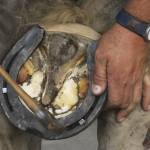Study: Farrier’s Role in Equine Healthcare Extends Beyond Hooves

Your farrier may be able to offer valuable healthcare advice on topics that extend beyond shoeing and soundness, including risky shifts in body weight, according to a recent study conducted in England.
“One of the greatest concerns regarding chronic obesity is the increased risk for laminitis in affected horses. As we know, laminitis is a painful condition of the hooves that threatens short- and long-term soundness as well as life expectancy in certain cases,” said Kathleen Crandell, Ph.D., a nutritionist for Kentucky Equine Research.
Because farriers generally interact with horses several times each year, the researchers believed hoof-care professionals have the ability to play a collaborative role in partnering with owners and veterinarians to “make every contact count in helping to prevent laminitis.” Farriers are, for example, capable and often willing to discuss other aspects of a horse’s care, including appropriate body condition.
“The researchers found that many horse owners acknowledge an inability to accurately assess their horse’s body condition,” relayed Crandell.
Other studies support this:
- Of 700 equine-property owners in New Jersey, 45% did not seek professional advice with regard to their horse’s nutrition, and an additional 15% of those owners reported having no dietary plan at all.
- An online survey of over 1,300 leisure horse owners in the U.K. identified both veterinarians and farriers as the most common source of information regarding health and nutrition.
- About 70% of Dutch horse owners sought information from their farrier regarding horse care and health issues, representing the second most important source of information after their veterinarian.
In no way did the researchers insinuate that farriers should replace your veterinarians. They simply pointed out the value in using a healthcare team.
“Equine nutritionists also play an integral role in management, providing insight regarding under- and overnutrition issues and ensuring your horse’s diet is appropriate and balanced,” advised Crandell. “Kentucky Equine Research offers nutritional consultation to personalize your horse’s nutritional needs.”
*Lynden, J., J. Ogden, and T. Hollands. 2018. Contracting for care: The construction of the farrier role in supporting horse owners to prevent laminitis. Equine Veterinary Journal 50(5):658-666.








